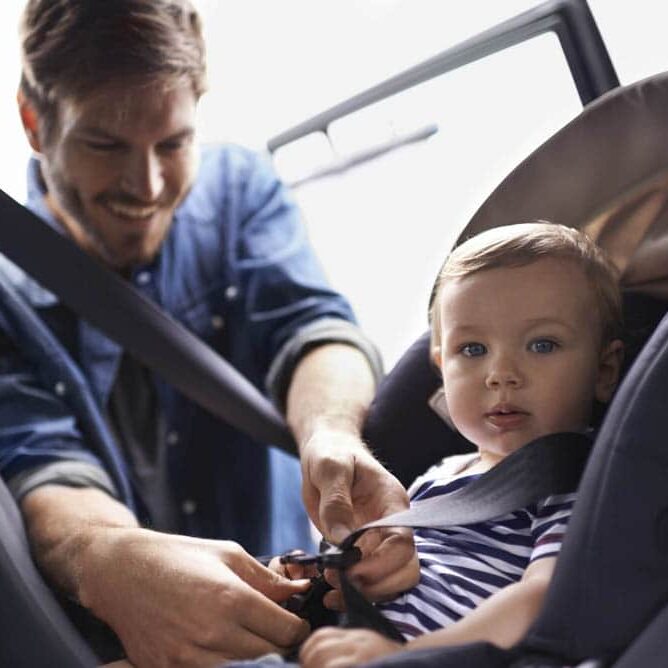General|Newborn Care and Parenting
Tips on Car Seat Installation

“Car Seat Safety” series. Guest Author: Angel Mattes
New parents often worry about keeping their little ones safe and navigating the world of parental responsibilities, and car seat safety is no exception. Whether you’re 9 months pregnant and installing a car seat for the first time, or seeing for the first time just how tiny and vulnerable they look strapped into their seat, it can be scary and overwhelming to know for sure whether you’re doing it right, and that your baby is as safe as they can be. You’re not alone.
As a tech, I can tell you that between the type of seat you buy, the type of vehicle(s) you drive, and the age/size/needs of your baby, there are millions of combinations of circumstances, each of which might require a different rule or usage. While it’s incredibly important that you read and familiarize yourself with your car seat manual, it’s also highly recommended that you consult with a professional. A certified Child Passenger Safety Technician (CPST) is your friend in this journey!
- You can find public seat check events and CPSTs through Safe Kids Worldwide and NHTSA
Best Practice
- Rear face to a minimum of 2 years old, but ideally to age 3 or 4, preferably until your child outgrows the rear-facing weight and height requirements of their car seat, whichever comes first. Although some seats and laws might have other minimums, toddlers are particularly at risk. See the Case for Rear Facing. When you DO decide to forward face, you’ll need to learn about the use of tether anchors (required when forward facing until your child uses a regular seat belt).
- Keep your child harnessed for as long as possible (meaning don’t prematurely move them to a booster seat & seatbelt), ideally until they outgrow the harness limits of their seat. Graduating a child to the next car seat or next “level” is not a milestone to rush. Remember: each step forward is a demotion in safety.
- Keep them in a high-backed booster seat until they pass the 5-step test. Kids are not ready for just a seat belt until they pass!
- Keep them in the back seat until at least age 13 (legally), but ideally until age 16. Airbags and children are a dangerous mix!
Installation tips: Signs of a Good Install
- Child fits the seat
- Seat is facing the right way (rear-facing until 2-4 years of age, forward facing after that)
- Seat is installed tightly – it should have <1” movement at the belt path
- Harness straps are at the right height for the child & the direction that the seat is installed:
- Chest clip is at armpit level & harness straps pass the pinch test
Other important factors to consider:
After-Market Products (products that did not come with your child’s car seat)
- Are not crash-tested with the seat, so they are considered unsafe and are not approved by the manufacturer (they may even void your warranty!). Beware of any “crash tested” verbiage on package, which is often a misleading and inaccurate marketing ploy.
- Are not approved by vehicle manufacturer
- May likely increase risk of injury
Projectiles
Be cautious of unsecured items – If it’s loose in your vehicle, it can become a projectile in the event of a crash. If you wouldn’t throw it at your baby’s face, then you shouldn’t have it unsecured in your car.
Next Seat Check
Once you’ve gotten your installation checked by a CPST, be sure to get your seat checked at least every 6 months, and again whenever:
- You change Baby’s position in the car
- You decide to change the install (LATCH to seatbelt, or from rear facing to forward facing, e.g.)
- You purchase a new car seat
- You purchase a different vehicle
- Your child outgrows the height or weight limit of your current seat
- You add a new child to the mix
RESOURCES
ONLINE RESOURCES
- The Car Seat Lady
- Car Seats for the Littles
- National Highway Traffic Safety Administration (NHTSA)
- HealthyChildren.org
Next Week: Shopping for the Right Car Seat
Angel Mattes is a Doula, Lactation Educator, and serves the Birthways community as our Labor Support & Continuing Education Coordinator. She trained and certified as a Child Passenger Safety Technician in 2013 and is passionate about educating parents and keeping children safe.

























